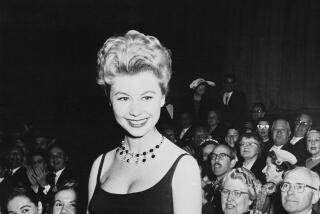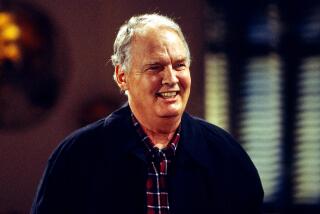Marlon Wayans on playing Richard Pryor: ‘I’m ready’
When it was announced that Marlon Wayans and not Eddie Murphy would be portraying Richard Pryor in the long-discussed biopic of the comedy giant, the news was greeted with Internet jeering. Wayans wasn’t surprised when he read the disparaging comments -- you can’t hang your star on films like “White Chicks” and “Little Man” without consequences.
FOR THE RECORD:
Marlon Wayans: An article about Marlon Wayans in Sunday’s Calendar misspelled the last name of filmmakers Joel and Ethan Coen as Cohen. —
“Look, I want to be able to make the stupidest movies ever, because they make people laugh and they make money,” Wayans recently said with a smirk. “But that’s not all I want to do. And I think I’ve proven to some people -- the ones paying attention -- that I can do more. Everybody else, well, they can wait and see and make up their mind.”
Wayans believes he is on the verge of winning over skeptics and just maybe establishing a name for himself that goes beyond his status as “the other Wayans” -- or maybe even “the other-other-Wayans.” The 37-year-old is the youngest of 10 children in the show-business brood that came to fame on “In Living Color,” the 1990s television show created and written by Keenen Ivory Wayans and Damon Wayans. His position in the family photo has given Marlon Wayans plenty of opportunity -- he and sibling Shawn got their own show, “The Wayans Brothers,” for four seasons on Fox beginning in 1995 -- but also an ongoing challenge in establishing anything resembling an individual identity.
“I have no complaints,” Wayans said, “but I do have a plan. I love doing comedy, but I also love to do drama.”
When it comes to laughter and tragedy, it would be hard to think of a figure that bundles them together in more compelling fashion than the late Richard Pryor, a Peoria, Ill., native who grew up in his grandmother’s brothel, was expelled from school at age 14 and went on to become a firebrand force in pop culture as a stand-up comic, movie star, writer. When, in 1998, he became the first recipient of the Mark Twain Prize for American Humor, he was described by Lawrence Wilker, the president of the Kennedy Center, as a signature voice in the national conversation: “He struck a chord, and a nerve, with America, forcing it to look at large social questions of race and the more tragicomic aspects of the human condition.”
The Murphy factor
The effort to bring Pryor’s story to the screen has been underway for a number of years and Jennifer Lee Pryor, the comedian’s widow, is part of the process. For many months, the conventional assumption was that Murphy would play the lead role. That’s not the case. Instead, Wayans arrived at lunch at a Los Angeles restaurant recently with the smile of a man who had a winning lottery ticket in his pocket.
“You need to be lucky in life, but it’s also what you do with your luck,” said the New York native, who still has sinewy arms from his role in last summer’s action movie “G.I. Joe.” “I’m ready.”
As of now, the defining image of Wayans in the public mind is likely a tiny con man impersonating an infant in the 2006 film “Little Man,” which was made with some unsettling CG-effects. There’s also 2004’s “White Chicks,” another gimmicky farce, where he played a black FBI agent in rubbery pale-face drag. The films were relentlessly crass and made a combined $215 million in worldwide box office. Many film critics, of course, were aghast, among them British writer Mark Kermode, who wrote, “There is no pit deep enough in the world to dispose of every single copy of this film. . . . ‘Little Man’ is bad for the world.”
That may well be true, but Wayans is trying to join a surging number of stars who specialize in coarse comedy and then pull their pants back up, step into a drama and ask the moviegoing world to quit laughing (But, seriously, folks. . .). Wayans doesn’t have to look far from his family history to see role models.
“In Living Color” alumnus Jim Carrey pretended to talk out of his butt (literally) in “Ace Ventura: Pet Detective” but then won critical acclaim playing Andy Kaufman in “Man on the Moon.” Will Ferrell and Jamie Foxx have had similar successes, and Adam Sandler, producer of the Pryor film project, with films such as “Punch-Drunk Love” and “Spanglish” has aspired to be art-house as well as outhouse in his screen times.
For Wayans, “Richard Pryor: Is It Something I Said?” (which begins shooting in the fall) is the sound of opportunity. “This is like an invitation to climb Mt. Kilimanjaro for me, and I’ve never been more excited in my life than when I got the role,” he said last week. “I want to be in dramas, I want to produce, I want to write and I want to prove I can handle a role such as this one.”
Fans of “Little Man” might have missed an earlier flash of dramatic ambition from Wayans. In 2000, he held his own in a cast with Oscar winners Ellen Burstyn and Jennifer Connelly and gave a shuddering performance as a hard-luck heroin addict in Darren Aronofsky’s junkie epic “Requiem for a Dream.”
He also veered away from expectations in 2004 with his role as the doomed heist man Gawain MacSam in “The Ladykillers,” the Southern crime farce by Joel and Ethan Cohen. Those two performances may have gotten him an audition for the Pryor film, but he locked up the role with a screen test that has already created a buzz about the movie in Hollywood circles. Bill Condon, the writer-director of the Pryor film, and Amy Pascal, the co-chairman of Sony Pictures Entertainment, locked in on Wayans after watching the tape of him re-creating Pryor monologue material.
Condon directed and wrote the screenplays for “Dreamgirls” and “Kinsey”; picked up an Oscar for adapted screenplay with the 1998 film “Gods and Monsters,” the story of “Frankenstein” director James Whale; and was nominated again in the same category for the 2002 film version of “Chicago.” He declined to be interviewed for this article -- he said it’s premature to publicly discuss a project that won’t reach theaters until next year -- but producer Mark Gordon said the Wayans screen test was “absolutely marvelous” and made him the “clear choice” for the film.
Still, Wayans will have two comedy legends breathing down his back on the project. Not only does he have to live up to the legacy of Pryor, he has to step out of the shadow of Murphy. Arnold Robinson, Murphy’s publicist, said his client was in talks regarding the project but that “differences on the creative front” led to the star and the filmmakers going in different directions.
“Eddie thinks Marlon will be wonderful in the role and he’s given his blessing for Marlon to do it,” Robinson said. “He’s looking forward to seeing Marlon in the role.”
Murphy was a friend to Pryor and the two also costarred in the 1989 period piece “Harlem Nights,” the only feature film ever directed by Murphy. The casting also made sense since Murphy’s last dramatic role was as a bombastic but scandalized R&B star in “Dreamgirls,” a role that earned him the only Oscar nomination of his 27-year film career. Gordon, the producer of “Saving Private Ryan” and executive producer of “Grey’s Anatomy,” said that in the end Wayans was the star who made sense.
“Obviously there are a number of requirements to playing Richard Pryor -- you have to be funny, of course, but this role also has so many colors to it that you need to be a strong actor who can handle the dramatic scenes,” Gordon said. “There were discussions with Eddie Murphy . . . Eddie Murphy is a great star, and I have no doubt he would be a great Richard Pryor. But Eddie Murphy is Eddie Murphy in the eyes of the audience. Marlon Wayans is a great actor and will be a great Richard Pryor, but he brings less baggage.”
Gordon added that “sometimes actors chase roles, more often producers and directors chase stars, but in this case we chased each other, and that’s a very exciting place for us to start off on.”
Gordon said the film will have “the light and the darkness” of Pryor’s odyssey but that “it’s a commercial film” and “a celebration of Pryor’s life.” Certainly, there are shadowy episodes to choose from, such as the 1980 incident in which he set himself on fire while drinking 151-proof rum and freebasing cocaine.
And Pryor’s life is not unfamiliar on the screen: He himself directed and starred in the 1986 movie “Jo-Jo Dancer, Your Life is Calling,” which was widely viewed as a semi-autobiographical tale, and there was a 2004 Showtime pilot called “Pryor Offenses” that starred Eddie Griffin as a character named Richard Pryor in situations inspired by Pryor’s comedy. Pryor, who died a year later, was executive producer of that show.
‘He changed comedy’
Pryor is a towering figure in comedy, especially in the African American community, where his mix of brashness, bravery and vulnerability on stage became a compelling conversation about the modern American black experience. He was audacious on issues of sex and race.
“He’s huge, there is so much feeling for Richard Pryor,” Wayans said. “It’s hard to be bigger than Richard Pryor. He changed comedy, and he did it in his own unique way.”
Wayans grew up listening to Pryor on vinyl records but only through a closed door. In the New York projects where the Wayans family lived, Keenen and Damonwould secretly listen to their father’s comedy albums and their little brother Marlon would in turn secretly listen to them listen to the albums.
“My brothers would react and laugh and imitate Richard and debate it and play it over and over, and that’s how he came to me,” Wayans said. “Richard Pryor meant so much to black people. Bill Cosby was like Martin Luther King but Pryor, he was like Malcolm X.”
Despite his cultural stature, Pryor was someone who might admire the filmography of Wayans, with its mix of class and crass. Pryor had no problem with lewd material -- and Wayans likes to think the long-gone comedy giant would approve of the “Little Man” who will portray him. “I think he would smile. And most of all, I hope, wherever he is up there, he laughs when he sees the movie.”


